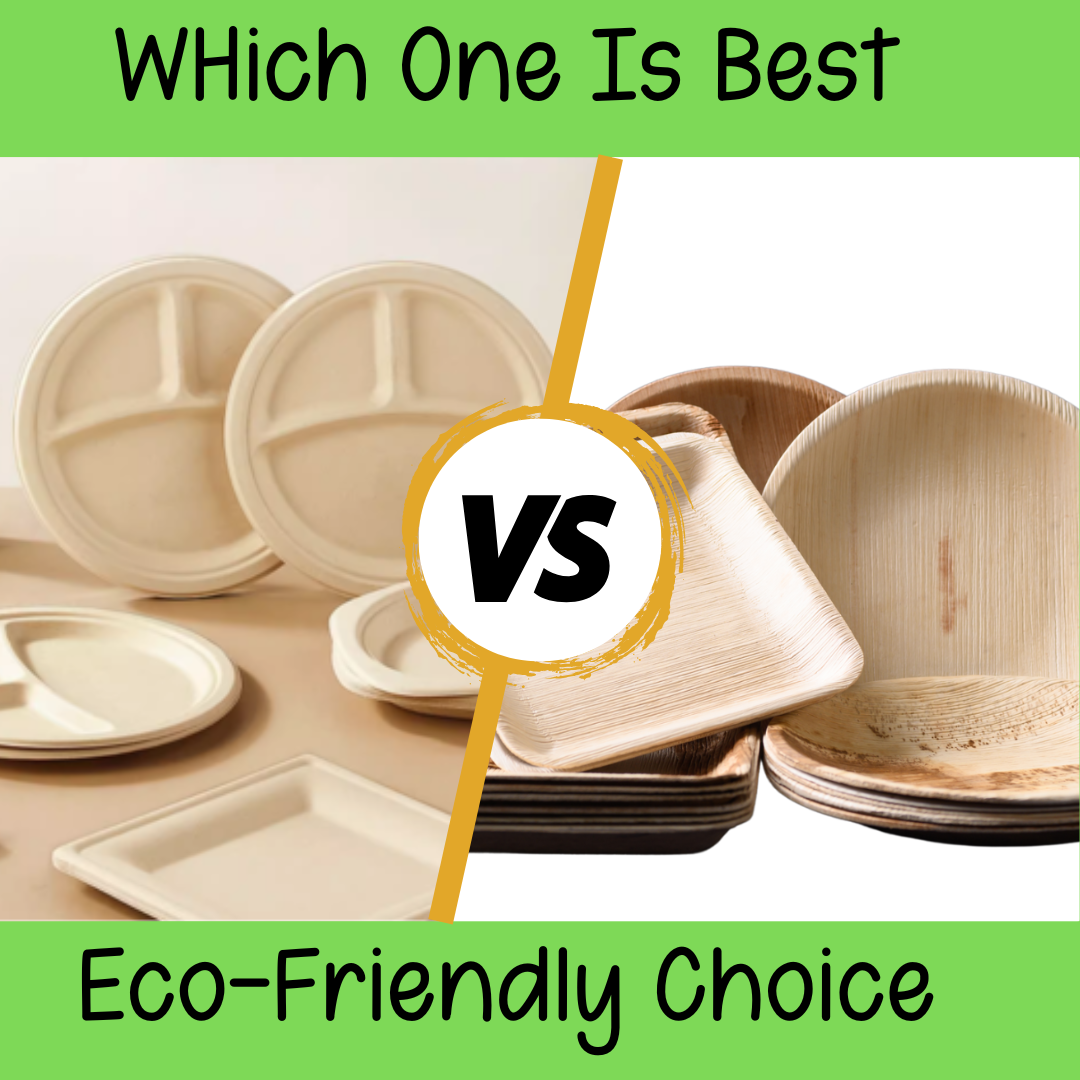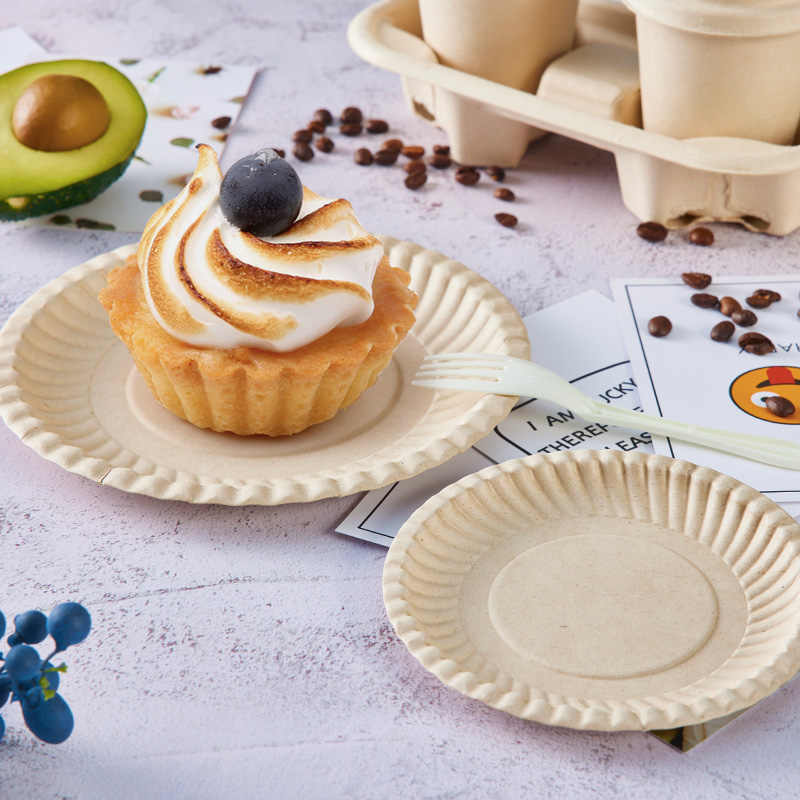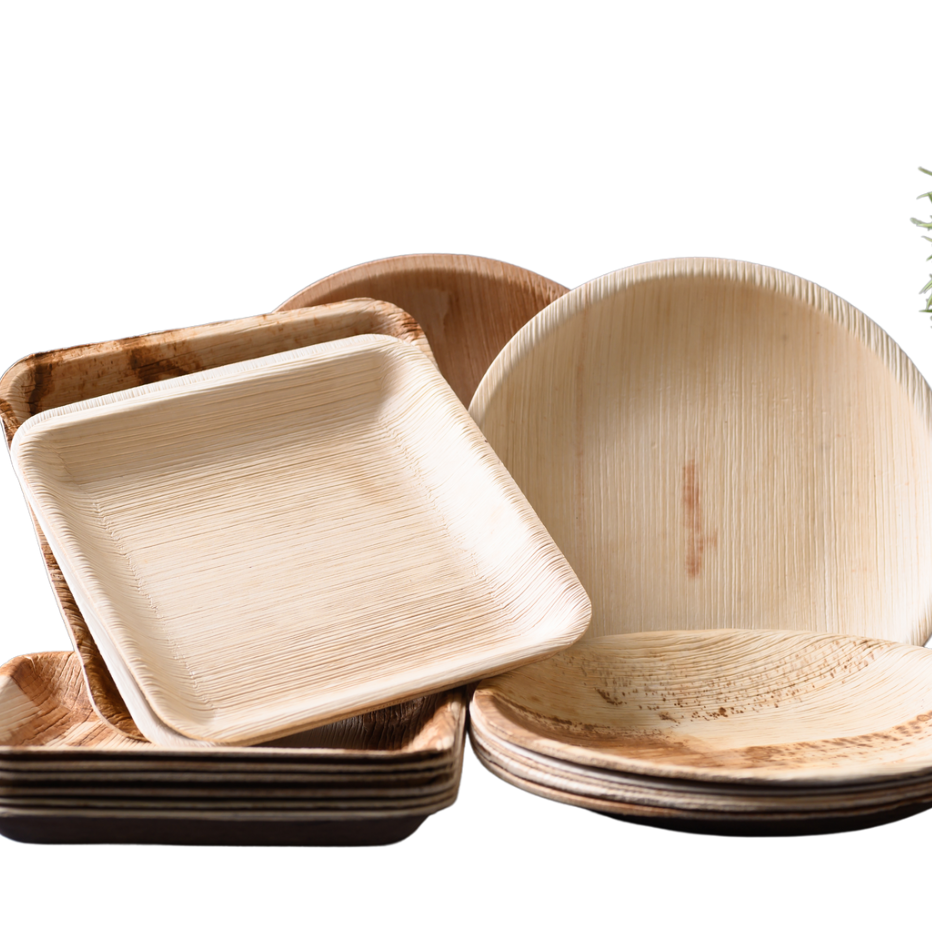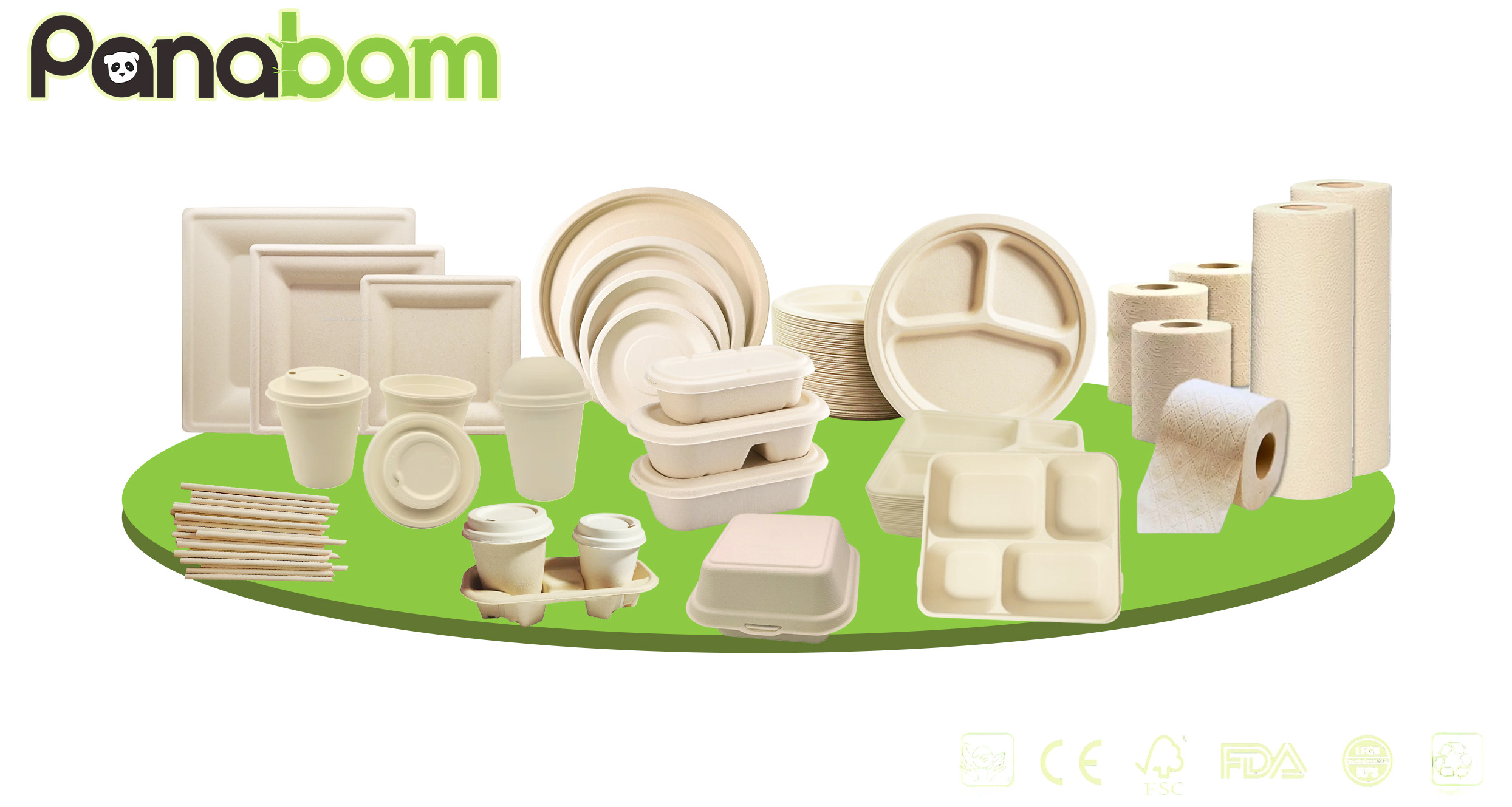
Eco-friendly tableware is on the rise. So, which is better for your business: bamboo or palm leaf plates? Let’s compare both to help you make the right choice.
Bamboo and palm leaf plates are sustainable options. This guide will help you determine which suits your needs best.
Read on to discover the advantages and challenges of both options.
What Are Bamboo Plates?
Bamboo plates come from bamboo stalks, a renewable and fast-growing material. Since bamboo grows quickly, it’s a popular choice for eco-friendly products. However, the cost of production is higher. Additionally, the manufacturing process can be complex, which further increases costs.
Bamboo plates are durable and eco-friendly but tend to be more expensive than other options.

Advantages of Bamboo Plates
Bamboo plates are strong and versatile. They can handle various types of food, from dry snacks to wet dishes. Furthermore, they look sleek and modern, making them suitable for both formal and informal occasions.
| Feature | Bamboo Plates |
|---|---|
| Durability | Strong and long-lasting |
| Aesthetic Appeal | Sleek and modern |
| Reusability | Reusable with proper care |
But bamboo plates also have their downsides. For instance, their high production costs make them pricier than other eco-friendly plates. Moreover, bamboo harvesting can lead to deforestation if not managed sustainably.
| Drawback | Explanation |
|---|---|
| Deforestation Risk | Unsustainable harvesting harms forests. |
| Production Complexity | The process of making bamboo plates is complex. |
What Are Palm Leaf Plates?
Palm leaf plates are made from fallen palm leaves. These leaves are cleaned and shaped into plates, requiring fewer resources. As a result, they’re more affordable than bamboo plates.
Palm leaf plates are 100% compostable and affordable. However, they aren’t as durable as bamboo plates.

Advantages of Palm Leaf Plates
Palm leaf plates are light yet durable. Thanks to their natural look, they’re ideal for casual, rustic events. Moreover, they are fully compostable, making them a great choice for zero-waste events.
| Feature | Palm Leaf Plates |
|---|---|
| Compostability | 100% compostable |
| Versatility | Suitable for dry foods |
| Natural Aesthetic | Rustic and unique |
However, they do have some weaknesses. For example, palm leaf plates absorb liquids, which can make them weaker when used for wet foods. Additionally, they may have a natural scent that some find unpleasant.
| Drawback | Explanation |
|---|---|
| Liquid Absorption | Absorbs liquids, weakening the plate. |
| Scent | A natural scent may be noticeable. |
Bamboo vs. Palm Leaf Plates: A Quick Comparison
Let’s compare both types of plates side by side.
| Criteria | Bamboo Plates | Palm Leaf Plates |
|---|---|---|
| Durability | Strong, reusable | Less durable with liquids |
| Aesthetic Appeal | Sleek and modern | Rustic and natural |
| Compostability | Biodegradable, fully compostable | 100% compostable |
| Best Use | Formal events, reusable | Casual events, single-use |
Which Should You Choose?
Event Type
Bamboo plates are perfect for formal events. However, if you’re hosting a casual gathering, palm leaf plates are the better option. Since they offer a rustic charm, they fit relaxed settings perfectly.
Food Type
For wet or saucy foods, bamboo plates are ideal. They hold up well against liquids without becoming weak. On the other hand, palm leaf plates are better for dry foods since they can break down with moisture.
Budget
If your budget is tight, palm leaf plates are a more affordable option. Yet, bamboo plates are a better long-term investment because they are reusable and durable.
Sustainability Focus
Both bamboo and palm leaf plates are eco-friendly, but they affect the environment in different ways. Palm leaf plates are fully compostable. In comparison, bamboo plates, although biodegradable, require more resources to produce. At PANABAM, we ensure all products are sustainably sourced.
Recommendations
Know Your Market
Understanding your customers’ needs is essential. If sustainability is their priority, both options work well. However, if they’re on a budget, palm leaf plates are better.
Marketing Strategy
When marketing these plates, highlight their eco-friendly features. Customers appreciate knowing they’re contributing to sustainability. By doing so, you can stand out in the competitive eco-friendly market.
Inventory Management
Track your stock to avoid shortages. Running out of plates could mean missing important sales. Offering both bamboo and palm leaf plates gives customers a range of choices to suit their needs.
PANABAM’s Commitment to Sustainability

PANABAM leverages a strong NPD pipeline to meet evolving food and drink trends, global market opportunities, and consumer behaviors like increased home delivery. We explore plant-based materials that are food-safe and certified compostable, enabling us to innovate with new, sustainable applications in foodservice packaging.
Website: www.panabam.com Address: 3th Floor No.1607, Century Avenue.Chongzhou city, Chengdu, Sichuan,China Products Range: Disposable Plates & Bowls: Bamboo-based, eco-friendly, and suitable for foodservice. Take-out Boxes: Biodegradable packaging for takeaway meals. Straws: Sustainable bamboo straws. Cutlery Sets: Knife, fork, spoon sets, customizable and eco-friendly. Coffee Cups: Sustainable, eco-friendly bamboo coffee cups for beverage service. Bamboo Pulp Paper Towels: Compostable and absorbent, perfect for eco-conscious households or businesses.
Conclusion
Both bamboo and palm leaf plates are sustainable options. By considering the event type, food served, budget, and sustainability focus, you can choose the right option for your business.
FAQ
1. Are bamboo plates really good for the environment?
A: Yes, bamboo plates are eco-friendly. They are made from a fast-growing, renewable resource and are biodegradable and compostable. Unlike plastic, bamboo plates break down naturally without leaving harmful residues. However, it’s important to choose bamboo plates from sustainably managed sources to minimize environmental impact.
2: Can bamboo plates be reused?
A: Yes, bamboo plates can be reused with proper cleaning and care. They are highly durable and resistant to damage, making them suitable for multiple uses. This also helps reduce waste.
3. Are bamboo plates safe for hot food?
A: Yes, bamboo plates are safe for hot food. They do not release harmful chemicals when exposed to heat, making them a safe option for serving both hot and cold dishes. Their natural properties ensure that your food remains safe and free from toxins.
4. Are bamboo plates free from harmful chemicals?
A: Yes, bamboo plates are free from harmful chemicals. They are made from natural bamboo fibers and do not contain toxins or chemicals that could leach into food. This makes them a healthy choice for dining, especially for families with children or those with food sensitivities.
5. Does the production of bamboo plates have an impact on the environment?
A: The production of bamboo plates has minimal environmental impact compared to traditional materials. Bamboo is a highly renewable resource that grows quickly and requires fewer resources to produce. However, it’s important to ensure that bamboo harvesting is done sustainably to avoid deforestation. Choosing certified sustainable bamboo products is key to minimizing environmental impact.
6: How do I choose the right tableware for my event?
When choosing tableware for an event, consider the following:
- Sustainability: Opt for biodegradable or reusable options like bamboo.
- Durability: Choose plates that can withstand the type of food and handling expected.
- Safety: Ensure the plates are food-safe and suitable for the temperature of the food.
- Aesthetics: Select plates that fit the event’s style and theme.
7. Are PANABAM’s products sustainable?
A: Yes, PANABAM is committed to sustainability. Our products are made from plant-based materials, are food-safe, and are certified compostable. We focus on innovation and sustainability to provide eco-friendly solutions for foodservice packaging. By choosing PANABAM, you are supporting a greener future.

Shmily Lee
Hi there! I’m Shmily, a proud mom to an amazing boy and the manager of PANABAM. We’ve been producing eco-friendly bamboo tableware that’s both sustainable and high-quality. I’m passionate about helping businesses embrace greener solutions. Let’s connect and create a more sustainable future together!